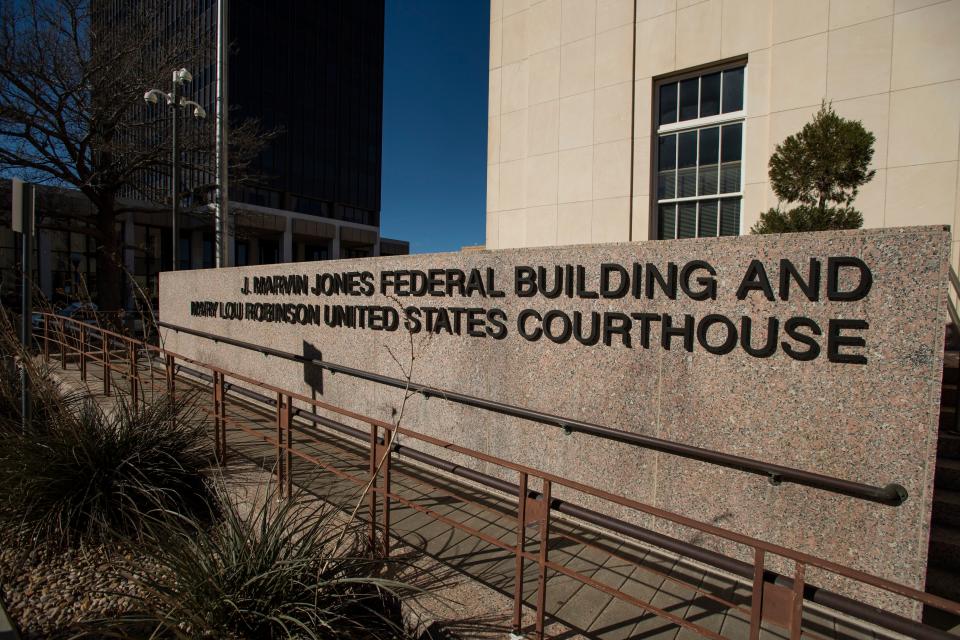Mifepristone: Who is Judge Matthew Kacsmaryk and why was the abortion pill case in his court?
WASHINGTON – A major ruling Friday to halt the approval of a widely used abortion pill shifted attention to a federal judge in Texas even as it enlivened a debate over how plaintiffs pick courts they hope will be friendly to their point of view.
U.S. District Judge Matthew Kacsmaryk, nominated to the bench by former President Donald Trump, suspended the Food and Drug Administration's approval of the drug mifepristone – an approval that is decades old but has taken on added significance since the overturning of Roe v. Wade.
Even before Kacsmaryk opened a hearing in his Amarillo, Texas, courtroom last month, the case had been rocked by reports that he sought to delay the announcement of its timing because of what he described as security threats. That move prompted a backlash from media outlets, including the publisher of USA TODAY, which asserted that the delay was unconstitutional.
What to know about Judge Kacsmaryk and the abortion pill case in his court
U.S. District Judge Matthew Kacsmaryk, sitting in the U.S. District Court for the Northern District of Texas, presided over more than our hours of argument in late Marchin Alliance for Hippocratic Medicine v. FDA. The plaintiffs in the case asked the court to temporarily suspend FDA approval of mifepristone.
Kacsmaryk, a Trump nominee, previously worked for First Liberty Institute, a conservative legal group that has shepherded many successful religious-based challenges through federal courts, including the Supreme Court.
In part because the case has drawn significant attention, it is inspiring a renewed debate over "judge shopping," when plaintiffs choose a court – and sometimes, indirectly, a judge – that they hope will be sympathetic to their position.

Who is Judge Matthew Kacsmaryk?
Kacsmaryk, a Florida native born in 1977, worked as a federal prosecutor in Texas before joining First Liberty Institute during the Obama administration. The conservative legal group has been involved with several major Supreme Court cases dealing with religion, including last year's decision in support of a high school football coach who lost his job after praying midfield following games.
Kacsmaryk was nominated by former President Donald Trump in 2017. His confirmation in 2019 was opposed by abortion rights groups and LGBTQ advocates, who noted that he once signed a letter that described being transgender as a "mental disorder." He was confirmed on a mostly party-line vote, with Sen. Susan Collins, R-Maine, joining Democrats in opposition.
Setup: A Texas judge could soon force a major abortion pill off market nationwide
Focus: Medication abortion may be the next focal point in the fight over abortion
Case tracker: A look at the key cases pending before the Supreme Court
Kacsmaryk ruled against President Joe Biden's effort to end a Trump-era immigration policy that ordered asylum-seekers to remain in Mexico as they waited for their U.S. court hearings. The Supreme Court, in its final opinion of the term that ended in June, reversed course and ruled that the Biden administration could end the program.

What is 'judge shopping'?
Lawyers have long sought to file their cases with a judge they suspect will be receptive. But some legal experts argue repeat litigants are manipulating a system in which some federal courts have only one judge assigned to hear cases. Rather than having a judge assigned at random, they're often guaranteed to get the judge they want.
Kacsmaryk sits in one of those single-judge divisions.
"Choosing this particular court was no accident," said Lorie Chaiten, senior staff attorney at the ACLU's Reproductive Freedom Project.
LGBTQ: Transgender athlete ban one of many LGBTQ fights brewing in courts
Who to watch: Why Kavanaugh, Barrett may be key to student loan forgiveness cases
Whatever Kacsmaryk decides will almost certainly be appealed to the U.S. Court of Appeals for the 5th Circuit, arguably the most conservative appeals court in the nation. And then there's a good chance the case will move on to the Supreme Court, potentially on its emergency applications docket.
"The general view is that it would be better if the rules would not depend on the forum and the outcome would not depend on the decisionmaker," said New York University School of Law professor Marcel Kahan.
But Kahan cautioned against reading too much into the impact of a first decision.
"These cases are subject to appeal," he said. "This judge is not going to decide the ultimate issue."
Why did Kacsmaryk want to delay publicizing the abortion pill hearing?
Kacsmaryk wanted to delay publicizing the timing of Wednesday's hearing, The Washington Post and other media have reported, because of the intense debate around the issue. The Post and others, citing unnamed sources, said Kacsmaryk was concerned about a "barrage" of death threats directed at the courthouse in Amarillo.
A number of media companies, including Gannett, which publishes USA TODAY, filed an objection with the court Monday.
"Across the ideological spectrum, the public is intensely interested in this case," the letter read. "The court’s delayed docketing of notice of Wednesday's hearing, and its request to the parties and their counsel not to disclose the hearing schedule publicly, harm everyone, including those who support the plaintiffs’ position and those who support the defendants' position."
Hours later, Kacsmaryk issued an order disclosing the timing of hearing.
Dig deeper
'We're done': Why California Gov. Newsom ordered the state to cut ties with Walgreens
Drug stores: Walgreens says it won't sell abortion pills in 20 GOP-led states
States: Where the abortion fight goes: Roe overruled, but the battle will continue
Related: How a Supreme Court case about pig farms could muddy looming debate over out-of-state abortions
Contributing: Christine Fernando, Mabinty Quarshie
This article originally appeared on USA TODAY: Mifepristone: What to know about Judge Kacsmaryk and the abortion pill
